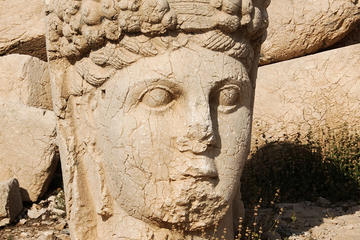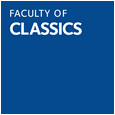Precarity, Vulnerability, and Power in the Theory and Practice of Greek and Roman Drama: the 23rd annual Postgraduate Symposium on Ancient Drama, June 2023

23rd Annual Joint Postgraduate Symposium on Ancient Drama: Precarity, Vulnerability, and Power in the Theory and Practice of Greek and Roman Drama
The 23rd Annual Archive of Performances of Greek and Roman Drama (APGRD) / University of London Joint Postgraduate Symposium on the Performance of Ancient Drama will take place on Thursday 29 and Friday 30 June 2023. This year’s theme is ‘Precarity, Vulnerability, and Power in the Theory and Practice of Greek and Roman Drama’.
About The Symposium
This annual Symposium focuses on the reception of Greek and Roman tragedy, comedy, satyr play, epic, lyric, and other texts in performance, exploring their afterlives through re-workings by both writers and practitioners across all genres and periods. This year’s theme seeks to explore the relationship between precarity/vulnerability and power, asking what the interaction between them might mean in the context of the reception of the ancient past. We have invited participants to consider any of the following questions: What constitutes ‘precarity’ in the context of ancient drama and its reception, and where in this precarity may power lie? Is the often-fragmentary survival of ancient drama itself a precarious phenomenon? Is there ever any power in precarity, and power in vulnerability? How does ancient drama explore the precarity of power, and in what ways has this theme been explored in modern receptions of Greek and Roman theatre? How integral a role does vulnerability play in ancient drama and its adaptations? Does vulnerability add power to a performance? How might generic transgressions, counter readings, and other means of reception exploit the power, precarity, and vulnerability of classical drama?
Event programme
DAY 1: University of Oxford
10.00-10.30: Arrival at the Faculty of Classics, Ioannou Centre, 66 St Giles’, Oxford, OX1 3LU
N.B. After the arrival / welcome at the Ioannou Centre, the morning sessions will be held at 38 St Giles', St Hilda's College annexe. We will walk down together from the Ioannou Centre or meet you there for 11am.
10.30-11.00: Welcome (Professor Fiona Macintosh, APGRD/University of Oxford)
11.00-11.45: Panel 1: Comic vulnerability and power (at 38 St Giles)
- Maria Waszkiewicz (University of Warsaw). ‘From servant to stage director, from passive woman to protagonist, and finally from master to pushover - Plautus’ play with conventions in Miles gloriosus and Lope de Vega’s answer in La dama boba.’
- Letizia Rivera (Universität Leipzig). ‘We are all just humans. Translating Vulnerability and Laughter in the Aristophanic Ekklesiazousae.’
11.45-12.15: Break
12.15-13.15: Panel 2: The empowered vulnerability of tragic heroines (at 38 St Giles)
- Alexia Dedieu (Université Grenoble Alpes). ‘Macaria’s sacrifice: vulnerability and power in the Early-Modern interpretation of a tragic heroine.’
- Mariam Kaladze (Ivane Javakhishvili Tbilisi State University). ‘Vulnerable yet Powerful: Medea on the 19th Century Georgian Stage.’
- Marta Cuevas Caballero (Universidad Pablo de Olavide). ‘Tragic Instances of Vulnerability: Antigone’s Suicide in Two Contemporary Spanish Productions.’
13.15-14.45: Lunch
14.45-15.45: Panel 3: Power of vulnerability in African receptions (at 66 St Giles, Ioannou Centre)
- Clare Chang (King’s College London). ‘Power to the People: the Choruses of Post-Apartheid South African adaptations of Electra.’
- Gifty Etornam Katahena (University of Ghana). ‘The Power of Vulnerability: Sophocles’ Antigone and Its African Reception.’
- Emmanuel Koomson (University of Cape Coast). ‘Ancient Greek and Roman Drama hid under the guise of modernity; a road to survival.’
15.45-16.15: Break
16.15-16.45: Guest response: Dr Giovanna Di Martino (University College London) (at 66 St Giles, Ioannou Centre)
16.45-17.00: Break
17.00-18.00: Guest lecture: Dr Estel Baudou (University of Lincoln): 'Creative precarities: Performing ruins in the 21st century.’ (at 66 St Giles, Ioannou Centre and live streamed online)
18.00: Reception and dinner (at 66 St Giles, Ioannou Centre)
DAY 2: Royal Holloway, University of London
Location: Caryl Churchill Theatre, Department of Drama, Theatre, and Dance, RHUL, Egham, TW20 0EX
10.00-10.20: Arrival
10.20-10.30: Welcome (Dr Emma Cox, Royal Holloway University of London)
10.30-11.30: Panel 1: Rethinking power and precarity in modern adaptations
- Andrea Monico (Scuola Normale Superiore di Pisa). ‘Lee Breuer’s The Gospel at Colonus: Oedipus between vulnerability and redemption power.’
- Millie Wan Marriott (Universities of Bristol and Exeter). ‘Performing the Metamorphoses: Dethroning Epic and the Power of Affect.’
- Amalia Costa, Eva Nacci, and Martina Valderrama-Boix (King’s College London). ‘Towards the Question of Agency and Power Systems in the KCL Greek Play: Iphigeneia 2023.’
11.30-12.00: Break
12.00-12.45: Panel 2: Queer power and precarity
- Selina Bick and Jip Kok (Radboud University). ‘Achilles in Drag: Vulnerability and Power in Trojan Wars (2021).’
- Domenica Taverna (University of Reading). ‘“This is the way. Forward. AND WALK!” Re-staging Tragic Passion into a Beacon of Queer-futurity.’
12.45-14.15: Lunch
14.15-15.15: Panel 3: Political power in Greek and Cypriot performances
- Philippos Karaferias (Université Grenoble Alpes). ‘The voices of Cassandra: the vulnerable life and the embodiment of grief in the Trojan Women of Theodoros Terzopoulos.’
- Olympia Glykioti-Karampekou (National and Kapodistrian University of Athens). ‘On power, powerlessness and potentiality: Theodoros Terzopoulos’ scenic approach of Aeschylus’ Prometheus Bound (2010).’
- Marina Paschalidou (University of Oxford). ‘Lament as Political Power: Examining adaptations of The Suppliants, Trojan Women, and Antigone.’
15.15-15.45: Break
15.45-16.15: Workshop: Cassandra’s costuming and performing power
- Milly Cox and Am Wyckoff (University of Oxford)
16.15-16.30: Break
16.30-17.00: Guest response: Dr Rosa Andújar (King’s College London)
17.00-17.30: Plenary
Participation and contact
The symposium will be free to attend and is open to students, researchers, and academics. You do not need to be a member of the University of Oxford to attend. Please register your interest by emailing postgradsymp@classics.ox.ac.uk.



